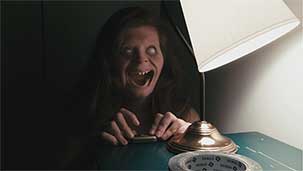Lights Out is adapted from a well-regarded short film of the same name.
…and in that statement lies the central difficulty that plagues this inconsistent, only occasionally interesting film: how do you manage to expand a perfect little three minute short into a feature length film.
In some ways you succeeded. There is some real depth of character here, with a couple of performances that hint at a rich backstory. However, what you didn’t manage to develop—and this is crucial to a film that mixes the supernatural with the mundane—is a compelling mythology.
Effective horror depends upon creating a world that allows and encourages the suspension of disbelief. For a film to really crawl into your head, it must convince the you that the monster, whether it’s a relentless xenomorph, a young child inhabited by a devil, a pagan harridan preying upon an isolated New England family, or even a robotic assassin, is grounded in a reality that is credible in the context of the central concept.
To achieve this without bogging the film down in endless, dry exposition is difficult. In Lights Out you manage, for the most part, to avoid the dreary exposition. But you didn’t manage to create a mythology that felt like anything other than a cut and paste horror franchise origin story. Your monster had no depth, and because of that everything else felt kind of weightless.
Often the most tragic element (and therefore most compelling) of horror films is how the creature came into being, but if you fail to convey that in a plausible way, it undermines what gives these kinds of film their visceral power. One of the better examples of this is Ringu, a Japanese horror film from 1998 (a film which Lights Out shares more than a little DNA with, especially visually). In Ringu we’re given evocative hints about how the demonic apparition came to be, and moreover we are led to feel more than a little compassion for the creature. This doesn’t happen with the fumbling and perfunctory attempts that Lights Out makes at creating a similar mythos.
There are some effective visual conceits throughout Lights Out that involve light and the absence of it, but too often the story seems pushed into corners to accommodate these sequences. And while the performances range from solid to exceptional (Maria Bello’s interpretation of a mentally disturbed mother is unsettling in its authenticity) the contrast between them and the cobbled together feeling of the creature’s backstory only serves to highlight the film’s central weakness.
Where Lights Out works best is in set pieces common to this genre. There are a couple of scenes involving Maria Bello and her young son, as well as one other unseen participant that are masterfully blocked to maximize tension. In these moments Lights Out creates a sense of dread that is not just about the shock of the reveal, but also about how something in the dark can be whispering your death into the ear of someone who you expect to protect and nurture you.
If the whole film had lived more fully in these moments, if you had managed to ground something fantastic in something that felt convincing, Lights Out would have been something more than an occasionally watchable genre film.
Horseshoes and hand grenades.
Sincerely,

Tim







